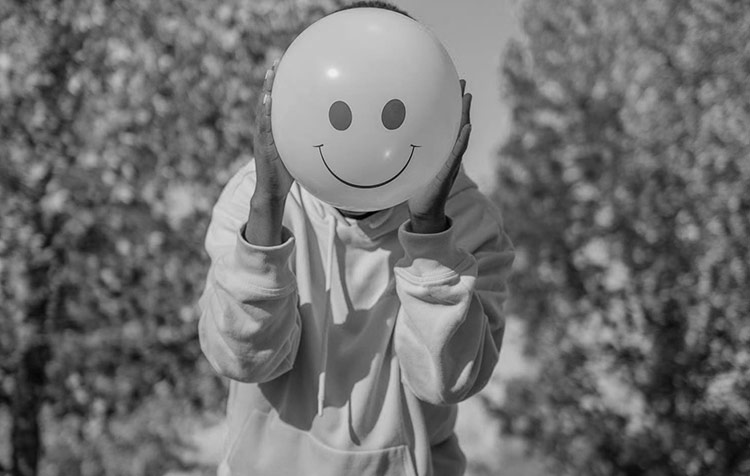Want to know all about toxic positivity? Then you've come to the right place! "Cheer up, it will get better" or "You just have to stay positive" - how many times have you felt bad about something and heard one of these sayings from other people? I'm sure quite often.
And even though you're aware that a positive attitude is actually good for you, those supposed encouragers not helped at all. On the contrary! Afterwards you felt completely lousy and even had a guilty conscience because you are so ungrateful and negative. But what is the reason for this? Is it because of you? Actually, no!
This phenomenon has been around for a while and is called toxic positivity. What this means, how positivity can be "toxic", how to recognize it and how to deal with it, I reveal to you in this article.
Here you can find a short overview in advance:
What is toxic positivity?

The official definition of The Psychology Group defines toxic positivity as "the excessive and ineffective overgeneralization of a happy, optimistic state in all situations".
This means that we are "served" on a daily basis that negative feelings and negative thoughts not allowed are that at every moment we are expected to be in a good mood all the time and even if something bad happens, that by thinking positively everything will just work out.
And yes, a positive outlook on life can be very good for us, but that alone can hardly solve a major problem. What is particularly toxic about this, however, is the fact that we can often feel worse, because we fail to "see the bright side in every situation!".
Why is toxic positivity so bad for us?
After all, ignoring and suppressing our own feelings can't be positive for us. Even if they are the so-called negative feelings, they can actually be good for us.
For example, fear can hold us back from participating in a dangerous opportunity. Grief helps us accept loss. Even anger and rage should not be suppressed.
Suppressed feelings will not disappear in any caseWe can only hide them for a while, but in a moment they will suddenly reappear. And as it is so often, it will happen at the worst possible moment and will only cause more problems.
Have you ever experienced that you were angry with a friend but didn't want to talk about it? And then you meet with your partner, he/she makes a bad joke, you can't take it anymore and all the anger, which is actually your friend's responsibility, unloads on your partner, who hardly understands what it's all about.
And what did you get in this case? You're still angry, but now it's also possible that this will lead to an argument with your partner.
This example is only trivial, but precisely because each of us has experienced something like this, it is a good lesson in what happens to suppressed feelings.
The second reason why toxic positivity is bad for us is the aforementioned fact that we feel worse because we are constantly under pressure to be positive, but can not meet these expectations.
How do you recognize toxic positivity?

If you're not sure what the difference is between real optimism and this Happiness lie these examples can help you.
1. reproaches instead of advice
Have you ever experienced that you tell other people about your problems, hoping to get some good advice - but in the end you only hear accusations and blame?
You are told that you alone are to blame for your condition or that you are not grateful enough, for all the other things in life that you have. This is a typical characteristic of toxic positivity.
Instead of getting help, you will probably just lose trust in that person in such a situation. And the next time you have a problem, you will talk about it with other people.
2. negative comparisons
Imagining the worst case scenario is a technique that is often used when you have to make a decision. In this case, it can actually be pretty good to know what the worst thing that could happen to you is.
But if you're going through a hard time and someone tells you it could be worse and compares your situation with the word case scenario or simply with a worse situation he or someone else has experienced, it doesn't actually help you and is not a solution to your problems.
Yes, in most cases, things can get worse. But that doesn't mean your problems aren't bad. Never let anyone convince you that your problems are not important enoughbecause others have to struggle with even worse.
3. lack of empathy
It is not always easy to understand other people's problems. That which means the end of the world for one person may be only a trifle for another.
Most of us, however, can at least try to understand other people's point of view, to put ourselves in their shoes, so to speak. Toxic positive people, however, do not do that. Their worldview is extremely egocentric and their only subject is themselves.
How does this manifest itself? Here are two example sentences:
- "I wouldn't be so ungrateful if I were you."
- "I don't know what you're complaining about at all, I would in your situation. one way or another deal with it."
Have you ever heard someone say that? Do you think that person really has a positive outlook on life, or rather that they lack empathy?
4. empty phrases
Toxically positive people also like to use phrases that may seem profound at first glance, but aren't actually helpful.
- "Cheer up, it'll get better."
- "What doesn't kill you makes you stronger."
- "Good vibes only."
- "Never give up."
- "All you have to do is smile and soon you'll feel really good about yourself."
Yes, pep talks are welcome in some situations. But when they come together with a proper advice, they are much more effective.
When someone suffers from an illness, we can't just tell them that it's all in their head. Likewise, when someone loses an important person, we cannot say that everything will be fine again.
His life will never be the same and this loss will forever be a part of him. Ignoring this fact will only prolong the pain.
5. the perfect picture
It's impossible to talk about toxic positivity and not mention social media. After all, we all know that such staged photos have little to do with reality. In "real" life there are no filters! Nevertheless, we allow such photos to influence us from time to time.
We ourselves choose the best photos and appropriate sayings for our social media profiles, WhatsApp status and hashtags, but when we feel uncomfortable ourselves and see similar posts from other people, we think they are true and that everyone else is better off than we are.
We then feel this pressure to make our own lives perfect, or at least to present them that way. And so we get caught in a vicious circle - we Are under pressure to live perfectly and be positivebut with our example we also put pressure on other people.
Can that be? Would you be ready to leave the comfort zone or do you yourself also belong to the toxic positive people?
Am I toxic positive?
If you yourself also only talk and post about the good parts of your life, if you often tell others that they should only think positively and everything will be fine or that they should be more grateful, it may be that you yourself are also positively toxic.
I'm sure you didn't intend to, and that is precisely the trap of toxic positivity: Often there are exclusively good intentions behind it!
The good news, however, is that it is possible to break through this toxic positivity.
How can I free myself from toxic positivity?

The most important step in ridding yourself of toxic positivity is to Allow and accept one's own unpleasant feelings. It's actually that easy.
Don't try to hide or suppress your negative thoughts and feelings. Yes, it will be painful and yes, it will not be easy. But you'll have to deal with them at some point anyway.
Only then will you have the opportunity to process your situation and move on. Afterwards, you will still have enough time for positive thinking and "good vibes only" ? Until that happens, these steps can help you.
How should I deal with negative feelings?
Once you have accepted your own feelings, even if they are uncomfortable, there are still a few things you can and should do.
Talk about it!
You can only end the vicious cycle of toxic positivity if you start, to talk openly about the negative feelings and conditions. I am sure you have some people in your life whom you trust 100 percent and who will be happy to help you. Talk to them, tell them everything about your problems.
If talking to your peers doesn't help, you still have the option of seeing an expert. A Psychologist or therapist can help you accept and solve your problems.
On the other hand, if you are the one or the one that someone opens up to, do not play down the negative feelings of your counterpart. You don't have any good advice? Then you can at least say that you understand how hard this person is having a hard time and that it's okay to be uncomfortable and that they can always get back to you.
Find a healthy outlet!
Another way you can deal with negative emotions is to channel them into an activity. Depending on your talents and abilities, you can be the best version of yourself. For some people, writing helps. It can be a Be a diary, letters, poetry or even a blog. ?
Other people find another creative way to express their feelings, such as. Painting, crafting or any other type of craft.
If you are not particularly creative, even Sports exercise can be a very good outlet. Would you rather get rid of your negative emotions by sweating while running or boxing, or do you think yoga is a better choice for you?
Whatever you decide, it will be better than suppressing and hiding feelings.
Tip: Speaking of sports! Perhaps also the Plogging something for you. You go jogging and collect plastic waste from the environment at the same time. Give it a try!
Recognize toxic positivity and talk about it!

Sometimes it's the result of a lack of empathy and a self-centered approach to life - and other times it's said quickly and not meant to be bad at all. Toxic positivity is definitely a part of our lives.
Whether we are the ones spreading it or suffering because of it. This toxic optimism should be dealt with like any other toxic relationship: you have to give it up.
Yes, probably everything will be fine again! But it's also perfectly okay that our lives are not good or even perfect at every moment. It's okay to feel bad and lousy, it's okay to be angry, sad or disappointed.
You don't always have to smile - honest dissatisfaction is much better for yourself and those around you than forced joy!
Stay positive,

PS.: A few empty phrases will not help to get rid of negative thoughts. But there are many helpful tips to avoid a possible Stop thought carousel. In the linked article you will get to know them now.






